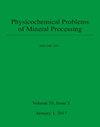The impact of batch flotation tests on the industrial plant prediction
IF 1.2
4区 工程技术
Q2 Earth and Planetary Sciences
引用次数: 0
Abstract
To predict the metallurgical results of industrial plants, laboratory batch flotation tests are carried out, relating both operations through scale-up factors. However, robust scale-up procedures and well-defined laboratory protocols are necessary to reach reliable results at industrial scale. In this paper, results from different flotation batch tests are presented, analysing the effect of batch protocol in terms of operating conditions, operator, ore type, water quality, and others on the metallurgical response. Additionally, the ability of batch responses to describe industrial operations and determine scale-up factors was analysed. Then, a sensitivity analysis was carried out, considering the effect of batch and industrial conditions on the estimation of scale-up factors. Results showed that the batch response significantly changes, depending on the operating conditions, flotation operator, and batch flotation machine, even for the same cell design. Additionally, it was observed that the batch recovery significantly changes when modifying ore type and water quality, which can cause changes in batch and/or industrial operation, affecting the scale-up factors. In addition, results showed that the scale-up factors varied significantly by changing operating conditions in a batch cell. This also occurs in plants when metallurgical performance changes, for example, due to a modification in launder design and/or operating condition, to increase recovery, or due to control limitations that prevent efficient metallurgical performance.批量浮选试验对工业厂房预测的影响
为了预测工业设备的冶金结果,需要进行实验室批量浮选试验,通过放大系数将两种操作联系起来。然而,要想在工业规模上获得可靠的结果,必须要有稳健的放大程序和明确的实验室规程。本文介绍了不同浮选分批试验的结果,分析了操作条件、操作人员、矿石类型、水质等方面的分批规程对冶金反应的影响。此外,还分析了批次反应描述工业操作和确定放大系数的能力。然后,考虑到批次和工业条件对放大系数估算的影响,进行了敏感性分析。结果表明,批次响应会因操作条件、浮选操作员和批次浮选机的不同而发生显著变化,即使是相同的槽设计也是如此。此外,还发现当矿石类型和水质发生变化时,批次回收率也会发生显著变化,这可能会导致批次和/或工业操作发生变化,从而影响放大系数。此外,研究结果表明,改变间歇式电池的运行条件,放大系数也会发生显著变化。当冶金性能发生变化时,例如,为了提高回收率而修改了洗涤器设计和/或操作条件,或者由于控制限制而无法实现高效冶金性能时,工厂也会出现这种情况。
本文章由计算机程序翻译,如有差异,请以英文原文为准。
求助全文
约1分钟内获得全文
求助全文
来源期刊

Physicochemical Problems of Mineral Processing
工程技术-矿业与矿物加工
CiteScore
2.20
自引率
6.70%
发文量
99
审稿时长
3.3 months
期刊介绍:
Physicochemical Problems of Mineral Processing is an international, open access journal which covers theoretical approaches and their practical applications in all aspects of mineral processing and extractive metallurgy.
Criteria for publication in the Physicochemical Problems of Mineral Processing journal are novelty, quality and current interest. Manuscripts which only make routine use of minor extensions to well established methodologies are not appropriate for the journal.
Topics of interest
Analytical techniques and applied mineralogy
Computer applications
Comminution, classification and sorting
Froth flotation
Solid-liquid separation
Gravity concentration
Magnetic and electric separation
Hydro and biohydrometallurgy
Extractive metallurgy
Recycling and mineral wastes
Environmental aspects of mineral processing
and other mineral processing related subjects.
 求助内容:
求助内容: 应助结果提醒方式:
应助结果提醒方式:


